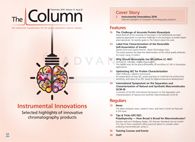Luis Colón and Sandy Dasgupta Win EAS Awards
Luis A. Colón and Purnendu (Sandy) Dasgupta have been honoured at the Eastern Analytical Symposium in Somerset, New Jersey, USA, for achievements in their respective fields.
Luis A. Colón and Purnendu (Sandy) Dasgupta have been honoured at the Eastern Analytical Symposium in Somerset, New Jersey, USA, for achievements in their respective fields. Colón was awarded the 2016 EAS Award for Outstanding Achievement in Separation Science at the event and Dasgupta received the 2016 EAS Award for Outstanding Achievements in the Fields of Analytical Chemistry.
Currently a professor in the Department of Chemistry at The State University of New York at Buffalo (UB), Luis Colón’s research interests are in the field of micro and nano chemistry, with particular focus on separation science, including the development of chromatographic media and column technology for chemical separations (high performance liquid chromatography [HPLC], capillary electrophoresis [CE], capillary electrochromatography [CEC], solid-phase extraction [SPE]), detection schemes for monitoring mass-limited samples, the use of nanomaterials in separations, and the development of new separation strategies to analyze complex chemical or biochemical sample mixtures such as biofluids, antiviral drugs in cells, and protein digests.
Sandy Dasgupta is currently Hamish Small Chair of Ion Analysis in the Department of Chemistry and Biochemistry and an adjunct Professor in the Department of Physics at the University of Texas at Arlington. His research interests include the measurement of trace atmospheric species and atmospheric chemistry, air pollution toxicology, automated intelligent analyzers, microfabricated sensors and instrumentation, thin film flow devices and sensors, automated process analyzers for the chemical industry, novel approaches to ionic analysis, breath gas measurement in disease diagnostics, and perchlorate in the environment.
For more information please visit: www.eas.org

Investigating 3D-Printable Stationary Phases in Liquid Chromatography
May 7th 20253D printing technology has potential in chromatography, but a major challenge is developing materials with both high porosity and robust mechanical properties. Recently, scientists compared the separation performances of eight different 3D printable stationary phases.
Detecting Hyper-Fast Chromatographic Peaks Using Ion Mobility Spectrometry
May 6th 2025Ion mobility spectrometers can detect trace compounds quickly, though they can face various issues with detecting certain peaks. University of Hannover scientists created a new system for resolving hyper-fast gas chromatography (GC) peaks.
University of Oklahoma and UC Davis Researchers Probe Lipidomic Profiles with RP-LC–HRMS/MS
May 6th 2025A joint study between the University of Oklahoma Health Sciences Center (Oklahoma City, Oklahoma) and the UC Davis West Coast Metabolomics Center (Davis, California) identified differentially regulated lipids in type 2 diabetes (T2D) and obesity through the application of reversed-phase liquid chromatography-accurate mass tandem mass spectrometry (RP-LC-accurate MS/MS).

.png&w=3840&q=75)

.png&w=3840&q=75)



.png&w=3840&q=75)



.png&w=3840&q=75)












